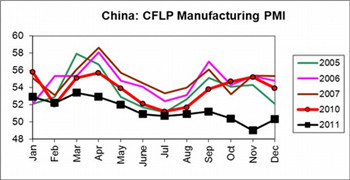
China's economy grew last month, according to a closely-monitored PMI series - which indicated growth for the first time in four months.
受到密切關注的財新(Caixin)采購經理人指數(PMI)系列調查顯示,該指數在四個月來首次顯示擴張趨勢。這一結果表明,上個月中國經濟活動出現了增長。
The Caixin-sponsored composite PMI for November came in at 50.5, the first time it had broken through the 50-mark separating contraction from expansion since July.
11月份,財新贊助的中國綜合PMI指數讀數為50.5。這是自7月份以來,該指數首次超過50這個區分收縮和擴張的榮枯線。
It had hit a record low of 48 in September, and was 49.9 in October.
今年9月,該指數曾跌至48這個創紀錄低點,10月份該讀數則為49.9。
He Fan, economist at Caixin, said:“This shows that the macro economy has moved further toward stable growth and the economic structure is improving. Future fiscal and monetary policies must be coordinated and large-scale stimulus should be avoided as much as possible.”
財新經濟學家何帆表示:“這表明宏觀經濟已進一步趨穩,經濟結構正在改善。今后必須協調財政政策和貨幣政策,盡可能避免大規模刺激。”
The Caixin-sponsored series is based on a much smaller sample of private companies than the official PMI reading, which focuses on larger state enterprises, and tends to be more volatile.
與官方PMI指數相比,財新贊助的系列調查的樣本是數目少得多的民營企業,其結果的波動性往往更大。而官方PMI指數則主要關注規模更大的國有企業。
Meanwhile the services PMI reading for the month was 51.2. It had been 52 in October. The manufacturing PMI, reported earlier this week, came in at 48.6 in November, versus expectations of 48.3. It had been 48.3 in October
同時,11月服務業PMI指數是51.2。此前的10月份該指數為52。本周早些時候報出的11月份制造業PMI指數為48.6,高于48.3的預期。10月份該指數則為48.3。











